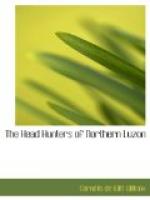At Payawan we were met by Captain Jeff D. Gallman, P. C, Lieutenant-Governor of the Sub-province of Ifugao, accompanied by one of his chieftains, who made a splendid picture in his barbaric finery. Erect, thin of flank and well-muscled, he had a bold, clear eye and a fearless look; around his neck he wore a complicated necklace of gold and other beads; each upper arm was clasped by a boar’s tusk, from which stood out a plume of red horse-hair. His gee-string was decorated with a belt of white shells, the long free end hanging down in front, and he had his bolo, like the rest of his people, in a half-scabbard—that is, kept by two straps on a strip of wood, shaped like a scabbard. But all these were mere accessories; what distinguished him was his free graceful carriage, the lightness and ease of his motions, the frankness and openness of his countenance.
Our rest over, we pushed on through a beautiful forest, unlike any other seen so far in that it was open. The trail was excellent, and rose steadily, for we had to cross a sharp range before making Kiangan. I shall make no attempt to describe this exquisite afternoon: but there was a breeze, the forest tempered the sun’s rays a good part of the time; and, as we rose, range after range, peak on peak opened on our view, valley after valley spread out under our feet until I wearied of admiring. The others had gone over the trail before, and looked on nature with a more matter-of-fact eye. At the top of the range I noticed an outcrop of fossil coral. Bubud distinguished himself to-day. Gallman, who was trotting immediately in front (and who ought to know his own trails!), called “Ware hole!” just as Bubud put one of his forefeet in it, pitched forward, and threw me over his head, thus establishing a complete breach of continuity between us. However, as long as the thing had to happen, it was a good place to select, for the trail was four feet wide here, and, in case of going over the side, the drop was only eighty or ninety feet, with bushes conveniently arranged to catch hold of on the way down. This was Bubud’s solitary mishap, and it was not his fault.
Past the divide, the trail became a road over which one might have marched a field battery, so broad and firm and good was it: we were nearing Kiangan. Presently we turned a low spur to the left, and the Ifugao town burst upon our view. It was the headquarters of a Spanish Comandancia in the old days, and here Padre Juan Villaverde lived and worked, seeking to convert the people, and to teach them to grow coffee and to plant European vegetables. The mission, however came to naught, leaving behind no trace visible to the casual traveller, save a few lone cabbages: the garrison maintained here was massacred to a man, the native who surprised and cut down the sentry being pointed out to us the next day. Kiangan was celebrated in Spanish times, and even more recently, as the home of some of the most desperate head-hunters of the Archipelago. But, thanks to Gallman, head-hunting in the Ifugao country is now a thing of the past.




